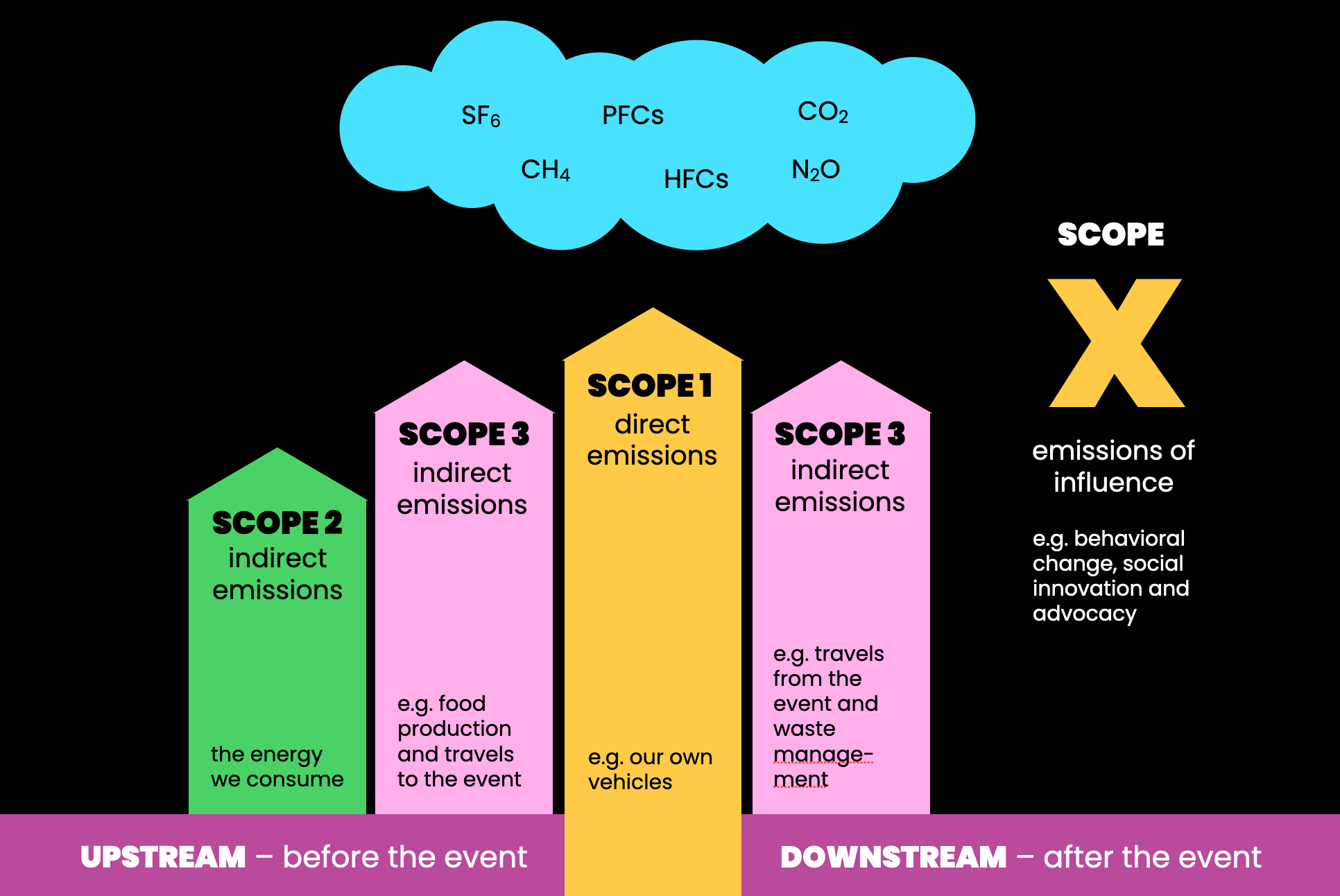
FROM FOOTPRINT TO HANDPRINT
The cultural and creative industries have an important role in the transition to a sustainable and resilient society. Festivals and events are meeting places that unite and inspire people.
Research shows that when people visit events, they are more open-minded and curious than usual, and more inclined to change traditional behaviors and norms.
Events are temporary cities that reflect society, which means that they can be ultimate playgrounds for radical imagination, innovation and transformation.
The stars of music and sports events set new trends and can put issues in the spotlight. They have a unique position of power thanks to their social status and platforms.
In other words – festivals and events can be transformative!
SCOPE X = EMISSIONS OF INFLUENCE
While scope 1, 2 and 3 define the direct and indirect footprint from an event, scope X defines the handprint – the emissions of influence on people, organisations, communities and our systems.

Learn more about transformative events in LiveGreen’s Masterclass
Module 3. Communication and impact guides you through the basics and bring many concrete examples of behavioral design, activism, advocacy and empowerment, as well as provide tools within strategy and impact measuring.
Among the guest speakers you find A Greener Future, Burning Man, Greenpeace, Institute for Sustainable Events, Fridays For Future, Reverb, Sweden Rock Festival, Make Equal, and more.
EVENTS + CHANGE
= HOW DOES IT HAPPEN?
LiveGreen are pioneers in sustainable event production, cultural transformation and artistic activism. Over the years, we have explored and documented different types of scope X activities. Here are some examples:
Behavioral design
We can nudge our visitors in the right direction through strategic communication and design. This can lead to long-term changes in behaviors and norms. Their actions will also impact the event’s carbon footprint as well as social sustainability.
Innovation
We need to support new social entrepreneurs that create solutions and challenge business as usual. An event can be a living lab for new innovations, products, methods and systems. We can prototype the future!
Check out Innofest, who connect sustainable start-ups with music festivals!
Activism & empowerment
Except from behavioral change and innovation we need system change. Political leaders won’t take action on the climate crisis or social injustices without public pressure. Events can be a place for activism, education and engagement. They can unite and empower people, and counteract despair and lack of hope (which are the true threats of our democracy).
PR & advocacy
We have a natural place in the spotlight. There’s a high news value: a temporary public get-together in combination with celebrities. Hence, there’s an opportunity to create debate and attention around certain issues. Event organizers and famous people can also mobilize and demand change from political leaders.
Radical imagination
Research shows that we lack stories on the transition we are facing. We have many dystopian stories about the future, but not many popular utopian ones where we manage to solve the global challenges. Events can visualize different future scenarios, at the same time as music and art can tell stories about them and explain complexity.
Communication & statements
By communicating our values and our sustainability policies, we can influence both our audience, our partners and the surrounding world. Many relate to and want to be associated with our brands. By clear communication and demands on our suppliers and partners, we can have a long-term influence on them. We should also dare to say “no” to partnerships and sponsorship deals with industries that cause environmental and social damage, such as fossil fuel companies.
BEST PRACTICE
Climate Live Sweden
In 2019, we were approached by climate activists affiliated with Fridays For Future. Recognizing that their school strikes had not achieved the widespread public support required, they sought to explore a new strategy: music concerts.
Fast forward to October 16, 2021, when youth-led concerts took place globally. In Sweden, Climate Live Sweden unfolded in Kungsträdgården, featuring performances by renowned artists such as First Aid Kit, Lars Winnerbäck, Loreen, Victor Leksell, and 17 other prominent Swedish artists. Greta Thunberg delivered a speech alongside young activists from countries heavily impacted by the consequences of the climate crisis. The concert was live-streamed on Aftonbladet and Dagens Nyheter, accumulating a quarter of a million views and drawing a physical audience of 12,000 people.
Since then, Climate Live has continued to shine a spotlight on climate justice and activism at events such as the Book Fair, various city festivals, and Håkan Hellström’s 20th-anniversary celebration at Ullevi.
Recycling Fashion Show
A festival has the potential to serve as a catalyst for sustainable ideas – a prime example being the Recycling Fashion Show. A group of young individuals engaged in the LiveGreen festival in Karlskrona had a vision: to create a fashion show with a focus on sustainability. Yet, the textile industry is both environmentally harmful and ethically questionable.
Through the Recycling Fashion Show project, a multitude of young participants found a creative space to channel their frustration into innovation. Collectively and individually, they crafted creations using recycled materials like seat belts, bubble wrap, old toys, IKEA bags, and various other upcycled items.
Burning Man: leave no trace
Burning Man events are held in various locations worldwide, with the original event attracting around 70,000 ”burners” to the Nevada desert annually.
In order to secure permission to host the festival in Black Rock City, organizers adhere to a principle known as Leave No Trace. Therefore, all participants need to learn how to minimize their impact on the environment, manage resources responsibly, and ensure that the area is left in pristine condition after the event.
Way Out West Goes Veggie
Following an analysis of the festival’s environmental impact, Luger decided in 2012 to transform Way Out West into a fully vegetarian event. The initiative sparked strong reactions and protests at the time.
Today, serving only plant-based food during an event is not strange. This illustrates that a radical idea today can become a norm tomorrow.
Studies from Gothenburg University revealed that 20% of attendees became more positive towards plant-based products and changed their dietary habits even after the festival. They simply carried a new behavior home with them. The conclusions from these and other studies suggest that individuals are more receptive to new messages and more open to change traditional behaviors and norms when attending events.
Source: Social Marketing Through Events by Henrik Jutbring
Fatta! and the consent law
”Fatta!” exists to transform the societal discourse surrounding sexual violence and consent in both practice and legislation.
The organization was established on September 9, 2013, in response to a pivotal moment when three individuals, charged with raping a girl with a glass bottle, were acquitted by the Umeå District Court. This verdict served as a catalyst for the collaboration between the organizations Femtastic and Make Equal, prompting them to take decisive action. The outcome of this collaboration was the birth of ”Fatta.”
The initiative began with the collection of 150 anonymous stories detailing instances of sexual assault. These narratives served as the foundation for the song ”Fatta,” performed by Cleo, Syster Sol, Kristin Amparo, and Nasteho Osman.
Sustainable Hardrock
Sweden Rock is Scandinavia’s biggest rock festival. LiveGreen initiated collaboration with the festival in 2017, jointly crafting a sustainability plan. An important element of this plan focused on communicating with attendees. How could sustainability, typically linked with hippie movements and activism, become a natural part of the hard rock culture? In the video, you’ll witness examples of our efforts to integrate environmental and gender equality considerations into the festival experience, brand, and corporate responsibility.
DO YOU WANNA WORK WITH LIVEGREEN?
We offer lectures and educational sessions, customize workshops, provide coaching and consultancy services, and can also serve as a partner in various projects.
+46 73-442 78 10
hello@livegreen.se
hello@livegreen.se
+46 73 4427810
Rosenlundsgatan 29 A
(Greenpeace Nordic)
Stockholm

2023. ALL RIGHTS RESERVED
DESIGN BY SVETLANA ZAKHAROVA